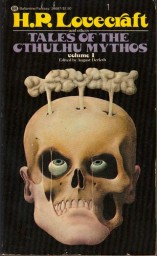 In the 1960s and into the early 1970s, there were genre specific anthologies that had Weird Tales reprints. The two genres are Cthulhu mythos and sword-and-sorcery.
In the 1960s and into the early 1970s, there were genre specific anthologies that had Weird Tales reprints. The two genres are Cthulhu mythos and sword-and-sorcery.
I mentioned in the previous post how the Arkham House anthology, Tales of the Cthulhu Mythos was my gateway to Weird Tales in general.
The first paperback edition was from Beagle Books in 1971. Volume 1 has nine stories from Weird Tales including H. P. Lovecraft, Clark Ashston Smith, Robert E. Howard, Frank Belknap Long, August Derleth, and Henry Kuttner. Volume 2 has four stories out of nine from Weird Tales including three stories from Robert Bloch and one by H. P. Lovecraft. There were three successive printings from Ballantine Books up through 1975.
Lin Carter edited a Cthulhu mythos anthology for the Ballantine Adult Fantasy series, The Spawn of Cthulhu (1971). Five stories are Weird Tales reprints out of 12 total. Carter managed to avoid any overlap in content with the Derleth edited anthology.
Sword-and-sorcery was the other genre for Weird Tales reprints.
L. Sprague de Camp edited four anthologies, three for Pyramid Books, and one for Berkley Medallion fro 1963 to 1970.
Swords & Sorcery (Pyramid, 1963) was the very first sword and sorcery anthology. Eight stories total, four from Weird Tales and one from Strange 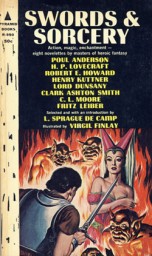 Stories. A good introduction as you have Robert E. Howard, C. L. Moore, H. P. Lovecraft, Clark Ashton Smith, and Henry Kuttner. The non Weird Tales include Poul Anderson, Lord Dunsany, and Fritz Leiber. The contents are impeccable; some of the author introductions by de Camp are detestable.
Stories. A good introduction as you have Robert E. Howard, C. L. Moore, H. P. Lovecraft, Clark Ashton Smith, and Henry Kuttner. The non Weird Tales include Poul Anderson, Lord Dunsany, and Fritz Leiber. The contents are impeccable; some of the author introductions by de Camp are detestable.
The Spell of Seven (Pyramid, 1965) had seven stories. Two are from Weird Tales (Clark Ashton Smith and Robert E. Howard). The book is a strong anthology with Michael Moorcock, Fritz Leiber, de Camp, Jack Vance, Lord Dunsany.
The Fantastic Swordsmen (Pyramid, 1967) contains eight stories. H. P. Lovecraft, Robert E. Howard, and one of Henry Kuttner’s “Elak of Atlantis” stories are all from Weird Tales. There is also a Robert Bloch story from a small press zine from the 1930s.
Warlocks and Warriors (Putman, 1970; Berkley Medallion 1971) had both a hardback and paperback edition. Ten stories with Weird Tales reprints from Robert E. Howard, C. L. Moore, Henry Kuttner, and Clark Ashton Smith. There is also a Fritz Leiber story from Unknown Worlds (1943).
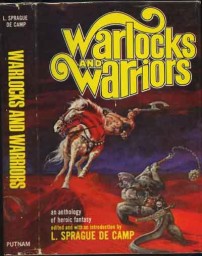
Lin Carter folded in some Weird Tales reprints within his fantasy anthologies. Carter’s anthologies are more wide ranging than L. Sprague de Camp’s. The Young Magicians (Ballantine, 1969) includes C. S. Lewis, E. R. Eddison, J. R. R. Tolkien, and Lord Dunsany. H. P. Lovecraft has two stories; 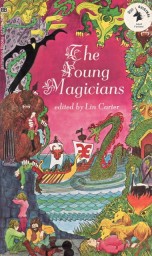 Robert E. Howard ard Clark Ashton Smith are additional Weird Tales reprints. A “Prince Raynor” story by Henry Kuttner from Strange Stories is also included.
Robert E. Howard ard Clark Ashton Smith are additional Weird Tales reprints. A “Prince Raynor” story by Henry Kuttner from Strange Stories is also included.
New Worlds For Old (Ballantine, 1971) has the same eclectic mix of fiction. Three reprints from Weird Tales by Robert E. Howard, Clifford Ball, and C. L. Moore are included. There is also a Lovecraft revision that never appeared in Weird Tales.
Carter edited a delightful little paperback for Lancer in 1970 called The Magic of Atlantis. Five out of seven stories are from Weird Tales. A King Kull story by Robert E. Howard, Poseidonis by Clark Ashston Smith, Elak of Atlantis by Henry Kuttner are among the contents in addition to Edmond Hamilton and Nictzin Dyalhis. The problem with this paperback today is the infamous bad glue that Lancer Books used. Handle the book at the risk of it falling apart.
The Magic of Atlantis was not the only foray into sword-and-sorcery anthologies from Lancer Books. Hans Stefan Santesson, 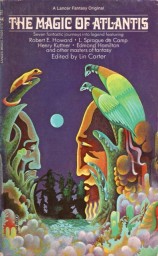 former editor of the magazine Fantastic Universe, edited two paperbacks.
former editor of the magazine Fantastic Universe, edited two paperbacks.
The Mighty Barbarians (1969) has the all time greatest cover to grace a sword-and-sorcery anthology ever. Five stories by Fritz Leiber, L. Sprague de Camp, Henry Kuttner, Lin Carter, and Robert E. Howard include two Weird Tales reprints (Howard and Kuttner).
The Mighty Swordsmen (1970) was the companion volume. There are two Conan stories in this book– one by Robert E. Howard and one by Bjorn Nyberg. Howard is the only Weird Tales reprint. Other contents are by Lin Carter, Roger Zelazny, John Brunner, and Michael Moorcock. This volume is definitely weighed in favor of recent fiction at the time of publication.
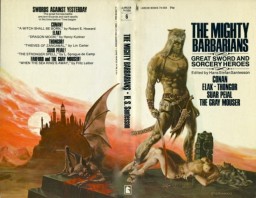
“The Mighty Barbarians (1969) has the all time greatest cover to grace a sword-and-sorcery anthology ever.”
Jim Steranko — what do you expect but sensational work? 😉
I’m curious: why do you consider DeCamp’s introductions in the _Swords and Sorcery_ anthology to be “detestable”? That’s a pretty strong word. Were they inaccurate, or trying and failing to be funny, or full of personal animosity or something?
I ask because DeCamp was famously polite and scholarly, so for him to write something “detestable” is surprising.
In SWORDS & SORCERY, de Camp’s introduction on Robert E. Howard includes “He suffered delusions of persecution.” No, not that we are aware of.
THE SPELL OF SEVEN has the infamous “Maladjusted to the point of psychosis” quote.
The intro to Lovecraft in SWORDS & SORCERY has “indulged in many obsessions and affectations.”
The introduction to Henry Kuttner in THE FANTASTIC SWORDSMEN states “Whether because of unjustified feeling of inferiority or for some other reason– the imitative period lasted longer than with most authors.”
Statements like this about a living person could get you sued. S. T. Joshi has remarked on de Camp’s “half-baked posthumous analysis.” He had no background in psychology but had to insert it into author introductions. This from a guy who used to write down what people were laughing at science fiction conventions. He did not naturally know what was funny. I used to have to deal with him when I was the official editor of the Robert E. Howard United Press Association. He would have his secretary call me as he did not want to speak on the phone.
-
LSDC’s attitude towards Howard never really progressed from the intro to KING CONAN back in 1953, did it, where he confidently stated that Howard, the “psychological case-study” drove thirty miles out into the desert before blowing his brains out. For someone who supposedly prided himself on the diligence of his research, and who positively revelled in debunking popular misconceptions, he was terribly prone to accepting hearsay as fact.
All of which only goes to fuel the conviction that pulp fiction and its practitioners were, insofar as he was concerned, a guilty pleasure rather than a serious interest.
Great piece. So many good books and stories. I think I need to get a copy of Carter’s Atlantis anthology.
Lord, I wish de Camp had stuck to writing and editing, but not editorializing or providing Lucy Van Pelt analysis.
I love the John Holmes covers for the Ballantine Mythos books. First saw them advertised in the back pages of Creepy and Eerie when I was a kid.
Why not put in a link to Building a Weird Tales Library Part 1?
Excellent, Excellent. I have an anthology of Lovecraftian horror set in the Old Testament that I will be working on after Buddha’s Dream. This is useful information! Thank you. 🙂